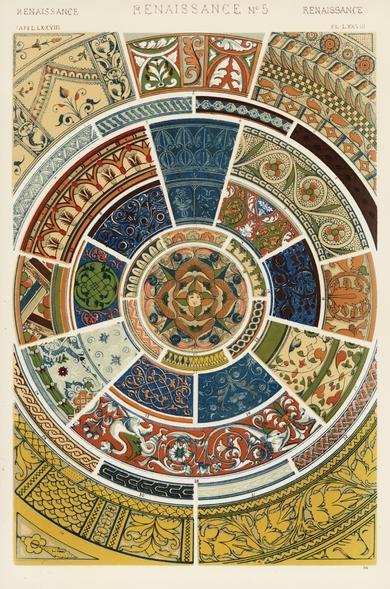Problems are Places, Questions are Spaces
Last year, while regrouping myself and rebuilding my old curious ways, I had a thought. The common words “spaces” and “places” pass through our minds, fingers, and lips but they deserve a second thought. Unsurprisingly, I wasn’t the first one to consider this and the wealth of reading material helped me write We Need Homes in the Delta Quadrant. Spaces and places have been an enjoyable lens to look through.
Recently, through Agnes Callard’s Open Socrates, I was introduced to the Socratic concepts of questions and problems. Initially I thought of it as a newish way to look at things, but I’m converging toward the idea that problems are places and questions are spaces. A quick exploration below as to why.
Vintage pattern illustration. Digitally enhanced from our own 19th Century Grammar of Ornament book by Owen Jones.Problems impede your quest and solving them makes them disappear. There are established ways of solving problems—recipes, algorithms, or rituals that nudge the obstacle aside so the original activity may continue unabated. Essentially, problems are tractable.
Places are tractable too as “an ordered worlds of meaning.” Place-making, like problem-solving, begins by drawing a boundary and then treating that encapsulation as a building black, whatever its inner workings. The moment you can stand somewhere and say “here” you have marked out a place; the moment you can name a difficulty and say “do this” you have packaged a problem.
The Socratic question, by contrast, is a quest. It is a hunt whose solution is unknown. Questions do not disappear when solved, instead they are additive and leave you with something, i.e. the solution. A real question insists on orientation before action: you must find north in the wilderness before plotting any march. And yet, along the path to an answer, you inevitably solve problems. Those problems are the markers that help you orient and keep you moving. A previous “solution” to a question can be used as a new place to further explore and prod at the question. In that sense, a question is like the horizon you constantly seek.
Spaces feel exactly like that horizon. Spaces are pure potential to be explored by the places that demarcate the space. Identity, orientation, and even memory of a space are created by and stored in the places that surround it. To explore a space you must create stable places around it
While the new way of thinking about Questions and Problems is great, I still prefer the lens of Spaces and Places. Q&P seem too narrow a set of lenses limited to the human mind. S&P expand that stage and allow us to think of more in that context. What I like even more is that spaces can also be places assuming we allow a boundary to be drawn around the fuzzy nature of a space. As a scientist, this feels a bit more satisfying because it allows you to explore and experiment even when the knowledge isn’t properly tied down by facts.
#AgnesCallard #cognitiveFrameworks #conceptualMetaphors #curiosity #epistemology #knowledgeExploration #philosophy #placeTheory #placemaking #questionsAndProblems #scientificInquiry #socraticMethod #spaceAndPlace #systemsThinking #yiFuTuan

